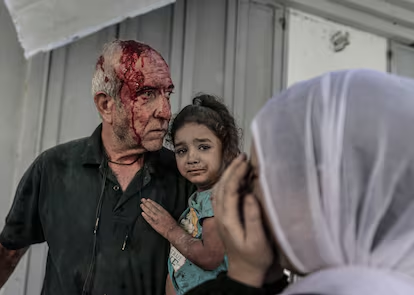Human catastrophe in Gaza
Civilians in the enclave cannot be made to pay for Hamas’ crimes. Israel must respect international law

That Hamas is not Palestine, nor does it represent all Palestinians, is a premise that is accepted by the international community and by a part of Israeli society, but Israeli Prime Minister Benjamin Netanyahu acts as if they were exactly the same thing. The unjustifiable collective punishment to which the 2.2 million Palestinians living in Gaza are being subjected goes beyond the right to self-defense. The response to the savage attacks of October 7 is absolutely disproportionate.
Crammed into a territory with one of the highest population densities in the world, Gazans are caught between two lethal threats. On the one hand, the total confinement to which Israel has subjected them, ignoring its responsibility as an occupying power since 1967 even though it has not been on the ground since 2005. On the other, the incessant bombings, which are causing a growing number of deaths, especially among children. Since the beginning of the Israeli offensive, 6,500 people have died in the Gaza Strip, including 2,700 minors. These are figures provided by the Gaza Ministry of Health, controlled by the Islamist organization, but they are also the ones used by United Nations agencies. To these we should add the more than 17,000 people who have been injured. Tuesday, according to the same source, was the most tragic day so far: 750 deaths (344 children).
For the past two weeks, Palestinians have not received water, electricity, food or medicines. This amounts to a siege that does not distinguish between the guilty and the innocent. The very few trucks with humanitarian aid that have managed to enter Gaza from Egypt represent just a drop of water in an ocean of urgent need. Medical centers, overwhelmed by the continuous arrival of injured people, cannot operate the equipment essential to keeping them alive, including premature babies in incubators. They also do not have fuel to start their electric generators: Israel has prohibited fuel from being included in the meager aid that’s been authorized past the Rafah border crossing. Following threats from the Israeli government, hundreds of thousands of Gazans have moved to the south of the enclave, sometimes harassed along the way by airstrikes ordered by the same army that forced them onto the road. The images coming out of Gaza show a trail of destroyed infrastructure; U.N. schools have become massive refugee camps and many people have begun to drink from salt water wells, putting their health at risk. We are witnessing an unmitigated human catastrophe.
What is happening to Palestinian civilians in Gaza is not part of Israel’s right to defend itself after the barbaric attack by Hamas. The condemnation of the terrorist acts that brutally killed so many Israeli civilians, and the solidarity with their families and neighbors, who are in an understandable state of shock, does not mean we must close our eyes to what has been happening in Gaza since that day. It is in the hands of Benjamin Netanyahu to put an end to this situation. Countries with influence on Israel, especially the United States, cannot limit themselves to expressing concern about the humanitarian situation while the Israeli prime minister carries on with his strategy, even challenging U.N. Secretary General António Guterres for merely providing the context of a conflict that is more than 70 years old. The Palestinians are not Hamas. They should not pay for the crimes of an organization that commits terrorist acts.
Sign up for our weekly newsletter to get more English-language news coverage from EL PAÍS USA Edition
Tu suscripción se está usando en otro dispositivo
¿Quieres añadir otro usuario a tu suscripción?
Si continúas leyendo en este dispositivo, no se podrá leer en el otro.
FlechaTu suscripción se está usando en otro dispositivo y solo puedes acceder a EL PAÍS desde un dispositivo a la vez.
Si quieres compartir tu cuenta, cambia tu suscripción a la modalidad Premium, así podrás añadir otro usuario. Cada uno accederá con su propia cuenta de email, lo que os permitirá personalizar vuestra experiencia en EL PAÍS.
¿Tienes una suscripción de empresa? Accede aquí para contratar más cuentas.
En el caso de no saber quién está usando tu cuenta, te recomendamos cambiar tu contraseña aquí.
Si decides continuar compartiendo tu cuenta, este mensaje se mostrará en tu dispositivo y en el de la otra persona que está usando tu cuenta de forma indefinida, afectando a tu experiencia de lectura. Puedes consultar aquí los términos y condiciones de la suscripción digital.









































